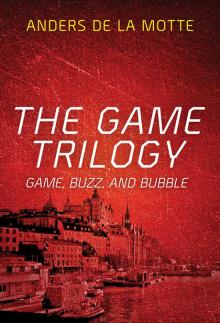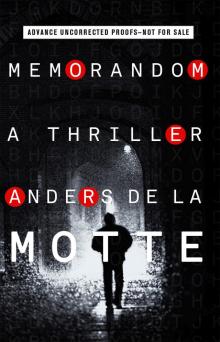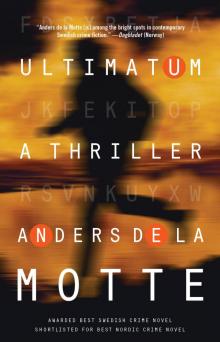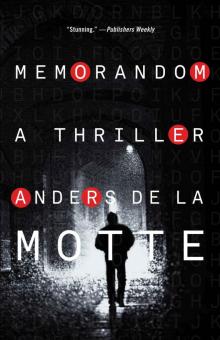- Home
- Anders de la Motte
Ultimatum Page 2
Ultimatum Read online
Page 2
It had taken time to build up the stock of pills. The staff had been very vigilant during the first week. They followed their routines to the letter, forcing him to open his mouth and stick his tongue out every time he took a sleeping pill. He had been careful. Played along and gained their confidence. He couldn’t afford to fail. If just one of the caregivers started to suspect, he’d find himself in the suicide wing and his plan would be thwarted.
He glanced out through the window. Between the trees he could just make out the little lake in the distance. He had explored the park during a couple of short walks when he was still considering other options beside the pills. But the light and all the sensory impressions out there had been too sharp. They exhausted his broken brain and forced him to stagger back into the safety of the building. But at least he knew that there was a fence and a heavy metal gate by the jetty. Floodlights, alarms, and cameras too, just as there were along the high brick wall by the road, and the double fence facing the dark forest on the other side. Barriers he wouldn’t have to confront. Because now he had the pills. He closed his hand around the plastic bag. Moved the pills one by one through his fingers. Counted them again. Even numbers, odd numbers.
Odds and evens.
Sarac shivered and pulled the blanket up over his legs. In spite of the heat in the gloomy little room, his fingertips and the end of his nose were always cold. He looked down at the notepad on his lap and tried to put his thoughts into words. But as usual they wouldn’t play ball. The senior consultant had suggested that he try to write down what he felt, and that was his task in advance of his next therapy session. Of course he could ignore the whole thing, tell the psychologist to go to hell and shut himself away in his room the way a couple of the other patients did. But he was keen to go on acting compliant for a few more days.
Janus, he had written. Not much to offer, really, and certainly not the sort of thing he was thinking of telling anyone.
I owe everything.
Debts I can’t escape till the day I die.
The loop of music was back in his head again. The lyrics that had helped him unpick his stroke-damaged brain last Christmas. Helped him reveal his own secrets. And his sins.
Anxiety tightened its grip around his heart and lungs.
Debts I can’t escape till the day I die.
He put the pad down and took the bag of pills out of the pocket of his cardigan. Moved the tablets around again like pearls on a strand.
Twenty, twenty-one, twenty-two. Only three more performances to go. Then the film of his life would be over at last.
• • •
Julia Gabrielsson turned the wheel and changed lanes abruptly as she put her foot down and with satisfaction felt the car respond instantly. It hadn’t driven more than a couple of thousand kilometers and still had that new-car smell, which was obviously preferable to the odors that would become ingrained in the seats over time. Fast food, various bodily fluids, and, not least, tedium. She had worked out a long time ago that you had to push yourself forward on Mondays, when jobs that had come in over the weekend were allocated. That way you could get hold of a decent car so you didn’t have to drive about in one of the worn-out old patrol cars that were parked in the far corner. So she always got in at six o’clock on Monday mornings and raided the key cabinet before going down to the gym. She made sure she was back in time for the morning meeting at a quarter past eight, alert, fresh from the shower, eager to get to work, and with the key to the best car in her pocket, while her bleary-eyed colleagues were sipping their first cups of coffee and wishing it was still the weekend.
She liked cars, liked driving fast. Dad used to practice his J-turns and controlled slides with her in the works parking lot every winter once she turned thirteen, and she had beaten the crap out of all the guys on the emergency response driving course. One of the many advantages of being the daughter of a police officer. It was just a shame Dad couldn’t see her now.
She finished overtaking and pulled back into the right lane.
“How long have you been back in Sweden?” Julia took her eyes off the traffic for a few seconds. High time for a bit of mundane chat with the civilian. Get him to reveal who he was and, more importantly, what he was doing on her team, in her murder investigation.
“Three weeks, give or take,” Amante muttered distantly.
“UN or Foreign Office?”
Amante shook his head. “Europol. Lampedusa. An Italian island in the Mediterranean.”
“Yes, I know. Where all the refugee boats from North Africa end up.”
Underestimating her general knowledge was a black mark, a big one that more than swallowed up the feeble plusses he had managed to scrape together so far. But she thought she’d give him a chance to correct his mistake. Or commit another one so that she could comfortably and guiltlessly file him away in the box marked Dry Academics, Type 1A.
“So you worked on refugee issues?”
“Yep. For two years,” he said with an awkward little smile. He seemed to have realized that he’d come across as patronizing.
“And now you’re here with us.”
She paused, waiting for him to explain why. But Amante merely sat there without speaking. Clearly she was going to have to try a different tactic.
“We could certainly do with some fresh blood in the Violent Crime Unit.”
That was perfectly true. The head of the unit, Pärson, held his protective hand over the old Tic Tac guys. He let them drink their way surreptitiously toward retirement at the end of the corridor. Or toward a fatal heart attack. The old men blocked the paths of other people’s careers as successfully as they did their own arteries, so the division was roughly fifty-fifty.
“We’ve been on our knees since Skarpö,” she added.
Amante looked up. “I was out of the country. Missed most of that. There were a lot of fatalities, weren’t there? Two police officers?”
“Nine dead in total. And even more injured. Several different criminal gangs clashed out there, and three of our colleagues got in the way. We still don’t really know why.”
“Oh.” Amante looked out of the side window. He wasn’t taking any of the juicy bait she was dangling right in front of his nose. He seemed more interested in the buildings swishing past along Sankt Eriksgatan.
Strange. Pretty much every police officer Julia knew wanted to talk about Skarpö. Tried to get the details out of her, anything that, against all odds, hadn’t yet been dissected and analyzed in the media or on the internal gossip network. About the gangsters and officers who had died out there, and above all about David Sarac, the heroic police officer who had survived.
“So what do you think of Eva Swensk, then?” she said in an attempt to find a fresh topic of conversation. “Our new national police chief,” she added, in a poorly disguised imitation of his dry tone of voice.
Amante turned his head toward her. “Do you know her?”
The traffic ahead of them slowed down. Julia changed lanes again and accelerated past a few more cars before skillfully pulling back into a gap. She gained five car lengths by the maneuver.
“No, I can’t really claim I do. We’ve only met a few times. I listened to a couple of her talks when she was regional police chief. She’s got a reputation for being tough and efficient. But I was still a bit surprised when Stenberg gave her the job. I thought it was going to be yet another man.”
Or, to be more accurate, one particular man, she thought. For some reason Deputy Police Commissioner Oscar Wallin had lost the race to Eva Swensk. Wallin had done all the dirty work of the reorganization only to find himself unexpectedly—and to the delight of many—pushed aside when it was time for the minister of justice to appoint a new national police chief. She still wondered what had actually happened. But Wallin wasn’t the sort of man you called up for a chat, so she’d had to contain her curiosity. It had been severa
l months since she last heard from him, which left her feeling slightly disappointed.
Wallin was one of the few police officers she regarded as a role model. Someone who, even though he was only four or five years older than she was, had managed to make a rapid ascent through the otherwise sluggish police hierarchy. She had hoped to be able to follow him up to the top. But instead she was sitting here, babysitting an inexperienced civilian.
“The minister of justice doesn’t seem afraid to try new tactics,” Amante said, breaking her train of thought. “Did you read the article in Dagens Nyheter last week? Stenberg’s on the offensive.”
Amante’s tone was a bit more engaged now, less robotic. This subject clearly interested him more than a straightforward massacre and a couple of dead officers.
“It’ll certainly be interesting to see how many of Stenberg’s ideas can actually be put into practice,” he went on. “Anonymous witnesses, expanded possibilities to use infiltration, amnesties, or reduced sentences for perpetrators who stand witness against their fellow criminals.”
“You don’t believe in all that, then?” Julia said. “It already works that way in a ton of other countries. The police need more effective tools against organized crime; you have to admit that, surely?”
Amante shrugged his shoulders. “It doesn’t really matter what I think. But people are saying that the Bar Association is likely to try to stop a number of the proposals. And if the opposition wins the election this autumn—”
Amante broke off abruptly. He blushed slightly, as if he’d suddenly realized he was talking too much. Julia put her foot down and changed lanes again, gaining a few more places in the queue. The maneuver made Amante grab hold of the handle above the passenger door. Julia smiled to herself. Just wait until we get the lights and sirens on. But that presupposed he’d be sticking around, which she doubted. Amante clearly wasn’t an expert in either violent crime or murder investigations, and didn’t seem remotely interested in the subject. He must have been recruited to the unit for some other reason. Because someone wanted or needed him there. Superintendent Pärson was a keen adherent to the path of least resistance. Everyone knew that the fat little bastard supplemented his horse-racing pot by tipping off the evening tabloids about ongoing investigations at advantageous moments. Yet no one was ever able to catch him. He knew exactly how often he needed to change his pay-as-you-go cell phone and Western Union account. And, perhaps most importantly of all, which people to stay on the good side of: whom he ought to do favors for, and when.
She glanced surreptitiously at Amante as they approached the heavy gates leading down into the garage of Police Headquarters at Kronoberg. She couldn’t quite make sense of the rhythm she had picked up from him so far. His age was difficult to determine; she guessed at thirty-five or so. But he spoke in a rather stilted way, like someone considerably older, more like a politician than a cop. And the way he dressed was something else. A blue blazer with the gilded emblem of the Royal Swedish Yacht Club on top of a coral-colored sweater with a designer logo, just frayed enough at the collar to suggest that its owner had worn it when he sailed around Gotland. Pale slacks with a neat crease and hand-sewn boating shoes. But in place of the slicked-back, sun-bleached hair that would have matched his well-to-do summer wardrobe perfectly, Amante’s dark hair was cut short. And he didn’t have a salt-splashed suntan from Båstad or Sandhamn with lighter patches left by his sunglasses either. Amante’s skin was swarthy, like someone from southern Europe. Or even farther south. His whole rhythm was full of contradictions, a syncopated beat that was hard to follow.
“Your surname,” she said. “Is it Italian?”
“Spanish,” he replied, slightly too quickly.
An image flashed through her mind. Something on the news, a row of smartly dressed EU politicians, something about the legal system. An articulate man making critical remarks about the government and minister of justice.
“Victor Amante. The EU politician?” She guessed the answer as she saw her new colleague squirm uncomfortably in his seat.
“He’s my stepfather.”
• • •
The quiet knock made Sarac slip the bag of pills under his pillow in a flash. It was designated rest time, so no one should be disturbing him now. Had the staff begun to suspect something after all? But a search team would hardly knock and wait politely to be let in before they turned his room upside down.
“Come in,” he said as calmly as he could. He leaned back against the pillow so that the bag of pills ended up behind his back. Damn, he should have slipped the bag back into the gap he had carved out behind one of the baseboards instead of hiding it in the first place he thought of like a startled five-year-old.
One of the caregivers, a man in his late twenties whose name Sarac thought might be Eskil, came into the room. Sarac noted that he closed the door behind him in a different way from usual. Carefully, as if he were trying to be as quiet as possible. Whatever Eskil was doing there, it definitely wasn’t a search.
“Hello, David.” The nurse glanced at the closed door, then put his hand in the pocket of his uniform tunic and held out a small white envelope. “For you.”
Sarac frowned.
“Who from?” he said, without taking the envelope.
“The guy said his name was Frank.”
“Surname?”
“He didn’t say. Just that you were colleagues of some sort. That he’d been looking for you last Christmas but didn’t manage to find you.”
Sarac closed his eyes for a few seconds, searching his broken mind for an image that matched the name. He didn’t succeed.
“What did he look like?”
“Dark hair, short, bit like a cop.”
“Height, build? Other distinguishing features? You must be able to remember something?”
Eskil shrugged his shoulders. “I don’t know. Normal height, normal build. Looked a bit like you, but not as skinny.”
“And where did you meet this Frank?”
Eskil looked like he was getting fed up with all the questions. Instead of answering, he held the envelope out a bit farther. Waved it gently in front of Sarac’s nose.
Sarac didn’t move. He was trying to work out if the nurse’s nervousness was because he had been threatened into doing this, or because he was used to taking bribes and didn’t want to get caught.
“Just take it, for God’s sake.” Eskil glanced over his shoulder again as if expecting someone to throw the door open at any moment. So he’d been bribed, then.
Sarac still didn’t move. Could this be some sort of trap? Were they trying to trick him? Find out what he was planning to do? The distant rumble of his nightmares was suddenly back in his head. He put his hands over his ears and shut his eyes tight.
Eskil gave up his attempts to hand the letter over and tossed it onto the bed next to Sarac before heading for the door.
“I’ll look in again in an hour in case you want to send a reply. Don’t tell anyone, okay?”
“Sure,” Sarac mumbled. “Actually, hang on . . .”
But before he had time to say more, the nurse had left the room. Sarac quickly put his hand under the pillow. The feeling of the plastic against his fingertips was strangely reassuring. It made the roar in his head subside.
The letter was lying on his bed, beside his left foot. He could read his own name in Times New Roman on the front. Detective Inspector David Sarac; nothing else. Unless there was something on the back. He picked the envelope up, turned it over, and held it up to the light. The back was blank, the envelope smooth and flat. It couldn’t really contain anything but a sheet or two of paper.
He hadn’t had any visitors for a long time, no contact with the outside world except for TV and the Internet. Perhaps Frank was yet another reporter trying to arrange an interview with him, an unusually creative one who was willing to bribe a staff member.
>
He slowly opened the envelope with his forefinger and pulled out a folded sheet of paper. At the top was a message in the same impersonal font as the envelope. Four lines, seven sentences, forty-six words. More than enough to make his heart beat faster.
He betrayed you, David. Swapped his future for you and Janus. Then he moved on while we bled and died out there on the island. No punishment, no consequences, straight to the top. How about a swap? Your secret for mine? A chance to get justice.
Sarac unfolded the bottom part of the sheet of paper. Two photos fell out onto the bed, landing upside down.
He turned the first one over. Husband, wife, two teenage girls dressed up for some sort of premiere. A good-looking, happy family smiling assuredly toward the photographer with perfect, dazzling media smiles.
His heart beat even faster. Spread out from his chest and up into his throat. He turned the second photograph over. Felt his hand tremble. He swallowed hard a couple of times.
The dead blonde woman was lying on her stomach across the black hood of a car. The pool of blood formed a sort of aura around her naked body. The force of her descent had been so strong that it almost welded her body to the expensive car. Transforming it into a single horrifying sculpture of skin, glass, and metal.
• • •
“The dismembered body at Källstavik: What do we know?”
The waitress had barely put their plates down on the checkered cloth and walked off before Deputy Police Commissioner Oscar Wallin revealed the purpose of their meeting. Julia couldn’t help smiling. Wallin hadn’t changed. Straight to the point, no unnecessary beating around the bush. Just like her. That morning he had suddenly called after months of silence. Now she understood why. Or at least what he wanted to talk about.

 Rites of Spring
Rites of Spring Game: A Thriller
Game: A Thriller End of Summer
End of Summer Buzz: A Thriller
Buzz: A Thriller The Game Trilogy
The Game Trilogy Bubble: A Thriller
Bubble: A Thriller MemoRandom
MemoRandom Ultimatum
Ultimatum MemoRandom: A Thriller
MemoRandom: A Thriller